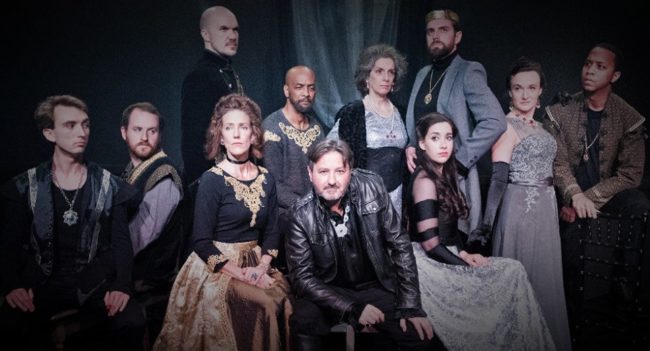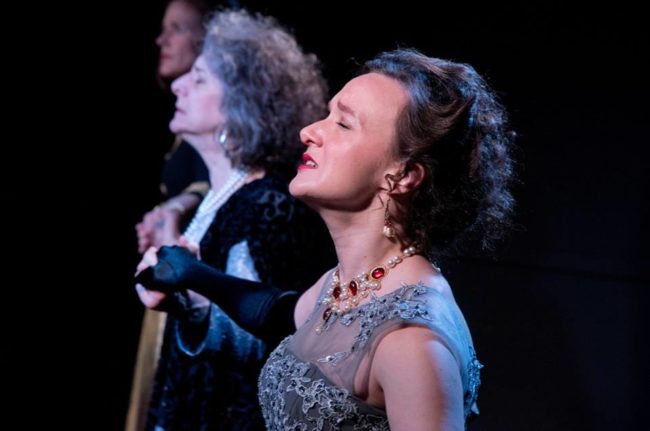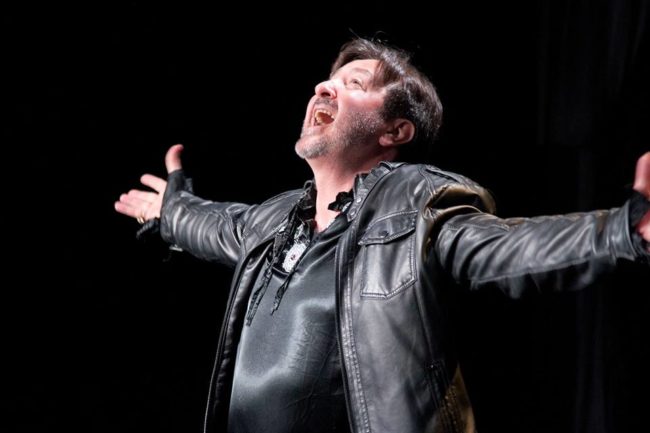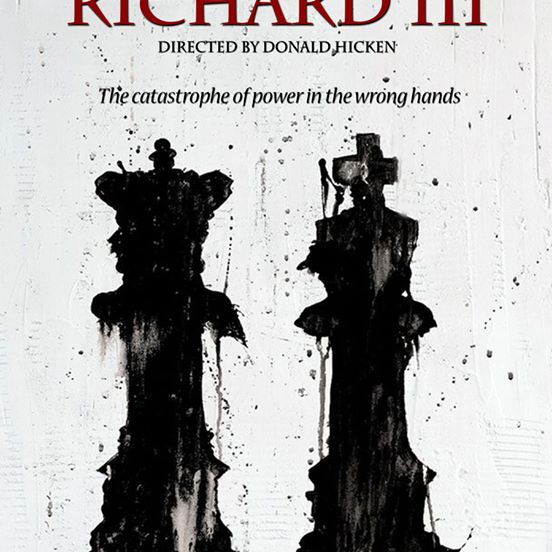“The catastrophe of power in the wrong hands.” An apt tag line for the Annapolis Shakespeare Company’s current production of Richard III as it speaks plainly to the Bard’s bloody history-borderline tragedy play and more broadly to situations at hand all around us right up to the currently political regime in the nation’s capital. Directed by Donald Hicken, this sharply rendered and quick-paced rendition of what is arguably the most violent of the history plays in Shakespeare’s canon, Richard III is a delicious showcase of ruthlessness in the hands of the power-hungry.

Approaching the production with a modernized and sleek aesthetic for the costumes and an otherwise minimalist design, Director Donald Hicken makes good use of the intimate rehearsal hall space for the production while the mainstage venue undergoes renovation in the company’s new home. Laying out the space with tennis-court seating allows for the maximization of the intimacy, which draws the audience that much more readily into the garish tale of Richard’s corrupt struggle for power. Costume Designer Sandra Spence keeps hints of regality handy in her threadwork; the whole cast when seen en masse looks not dissimilar to the cover of Vanity Fair.
Hicken’s only real misstep in directing this production is that he hastens the scenes along so quickly that there are moments where the breakneck paced action gets swallowed up inside of itself. With just a hint of pause between some of the scenes, rather than one treading harshly and heatedly upon the heels of another, the audience would be more readily able to digest what they’ve witnessed. This would be particularly useful to those unfamiliar with the text and plot, though Hicken ensures that the actors are up to snuff when it comes to clearly communicating Shakespeare’s archaic text.
With just eleven members of the ensemble tackling over two dozen roles, it is no surprise that nearly every performer is doubled up. This is true of nearly everyone except for the four actresses playing Lady Anne, Queen Elizabeth, Queen Margaret, and the Duchess of York, and naturally the title character. Hicken divides the roles quite evenly among those remaining, making— for the most part— smart choices about who doubles up as who and how. Alexander Burnett is the lone example of where Hicken’s triplicate casting falters as Burnett plays Lord Hastings, Prince Edward, and Tyrrel. While his portrayal of Tyrrel is fascinating— akin to a Slenderman type character that haunts the soul simply by standing— there is no discernable difference in physicality, voice, or presentation to distinguish his Prince Edward from his Lord Hastings. This becomes problematic when one scene clips atop the heels of another and Burnett flips from one character to the other and the lack of distinguishing differences leaves a brief puzzlement as the scene gets underway.

Of the four females taking their oppressed roles in Richard’s wayward kingdom to task, Queen Elizabeth (Laura Rocklyn) arises the leader of the pack when it comes to emotional fortitude and deep connections of pathos to her words. She’s chased quickly by Queen Margaret (Sue Struve) and the Duchess of York (Julia Brandeberry), both of whom possess exceptionally expressive facial features and deep understanding of how to emotionally connect with the text. Unfortunately, Olivia Ercolano— playing the young Lady Anne— does not measure up to these powerhouse females in the production. While her speech is clear, her emotional connection to the character— particularly when squaring off against Richard in the main encounter early in the first act— is lacking in both depth and feeling. This could easily be dismissed and even go unnoticed if the other three women weren’t drawing such attention to their own characters’ plights with tidal wave force performances. Rocklyn is particularly empowered when blasting at Richard in the back half of the play, and Struve is frightening when she starts barking forth her pox and curses.
The most dynamic and intriguing relationship that burbles, blossoms, and eventually cankers is the running allegiance between the Duke of Buckingham (Brian Keith MacDonald) and Richard (Kurt Elftmann.) Watching the way MacDonald follows along with unyielding determination every time Elftmann’s Richard hatches the next phase of his diabolical scheme is ultimately rewarding when he is— as the story goes— played to be but a mere pawn in the grander scheme of things. Both MacDonald and Elftmann have a strong sense of how to play in a scene with one another, with the former exhibiting a firm restraint on his spirited enthusiasm when necessary, making his defection that much more engaging when it comes.

Elftmann takes a curious approach to the role of Richard itself, minimalizing his portrayal of the bloody Duke’s deformity. Hardly even appropriating a limp or hint of a hunch, Elftmann’s portrayal delves deep into the psyche of Richard III, forcing the audience to see a madness that drives this bloodlust rather than a physical justification. By minimalizing his physical portrayal of Richard’s deformities it takes an almost Tennessee Williams’ approach to his ailment— that it’s mostly perceived in his head. This is a harrowing blow to the way the production is played out, making Elftmann’s Richard ruthless, compassionless, and truly disturbing. This is echoed further (with an excellent assist by Lighting Designer Adam Mendelson) during the penultimate scene wherein the ghostly parade visit the varying war tents of Richard and the Earl of Richmond (Steve Polites).
Ultimately a well-performed and carefully edited compacted version suitable for those with a good working familiarity of the story, Richard III at Annapolis Shakespeare Company is a good representation of their classical bench.
Running Time: Approximately 2 hours and 5 minutes with one intermission
Richard III plays through June 11, 2017 at Annapolis Shakespeare Company— 1804 West Street Suite 200 in Annapolis, MD. For tickets call the box office at (410) 415-3513 or purchase them online.

